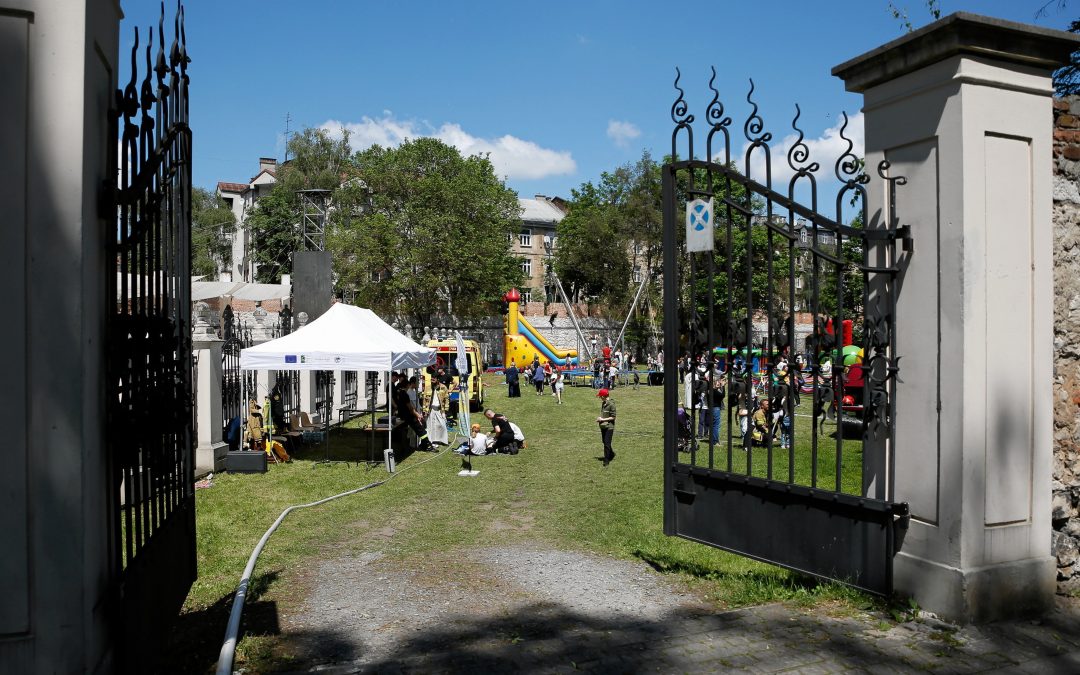Residents of central Kraków have a new green space open to them after the city reached an agreement with a Catholic monastic order to turn part of its land into a park. Kraków’s mayor said that other areas owned by the church could also soon be opened to the public.
The 0.5 ha (1.24 acre) meadow in the district of Kazimierz was opened on Children’s Day, 1 June, with various attractions organised for local youngsters and an exhibition by local artists. It will be leased free of charge by the city from its owners, the Pauline Fathers monastic order.
In return, the city will be responsible for keeping the green space in good order. Benches and other equipment have already been installed. The new park will be open during the day and closed at night. Dogs will not be allowed.
Poland’s former royal capital caused some surprise among many locals last year when it was named the world’s fifth greenest city in an international index (this year it went one better, coming fourth).
The ranking was based on analysis of satellite image data, and the head of the city’s parks and greenery department, Piotr Kempf, admitted that much of Kraków’s green space was privately owned, including by the church.
Kraków has been named the world's fifth greenest city in an international ranking
Some local activists expressed scepticism at the index, which is based on analysis of satellite images. They argue that much of Kraków's green space is actually inaccessible https://t.co/C52snfvV6t
— Notes from Poland 🇵🇱 (@notesfrompoland) February 26, 2021
Shortly after last year’s ranking was announced, a group of city councillors and activists wrote to Pope Francis asking for help in opening the green spaces owned by Catholic orders in the city, reported Wirtualna Polska.
Some 16 hectares of green space in Kraków city centre belong to church orders and are closed to residents. A previous appeal in 2013 by city councillors to seven orders to open their gardens at least for one day was only answered by one and came to nothing.
Radni oraz działacze miejscy z Krakowa piszą list do @Pontifex_pl z propozycją dyskusji na temat udostępnienia części ogrodów klasztornych w mieście z poszanowaniem klauzuli oraz charakteru tych miejsc. Poniżej cały list via @wirtualnapolska pic.twitter.com/uws3CuqbqE
— Marcin Makowski (@makowski_m) March 9, 2021
“I thank the prior for making the meadow available to residents,” said Mayor Jacek Majchrowski at the opening. “We are also holding talks with some other orders that could be open to residents.”
The gardens tended by the monks are also to be opened to visitors, but only in groups with a guide and on specific days, starting this summer.
“We very much need such places in Kazimierz,” said Kempf. “We want to supplement it with a cultural offer, such as the sculptures and paintings today that blend in with the trees and walls. Artists, of whom we have many, especially in Kazimierz, have a space for themselves here.”
#Krakow #skałka #łąka 🍀🌿#Umowa podpisana, łąka udostępniona mieszkańcom!
Zapraszamy za mury klasztoru oo. Paulinów na Skałce.🧒👧Dziś przy okazji #DzieńDziecka naprawdę sporo się tam dzieje!
📸 @BSKrakow @krakow_pl pic.twitter.com/XR9zlgvYtW
— Kraków (@krakow_pl) June 1, 2022
“Today’s opening of the meadow is a symbolic gesture connected to the 550th anniversary of the presence of the Pauline Fathers on Skałka,” said Father Mariusz Tabulski, the prior of the order. “It is our invitation and a nod to residents looking for quiet and a safe space in the city centre. One can rest here in the vicinity of monuments important for Poland’s culture and heritage.”
The Pauline monastery is located on the “Skałka” (meaning “little rock”), an outcrop overlooking the Vistula River. The “Church on the Rock” was visited by every Polish king on the eve of his coronation as penance for the actions of his predecessor, Bolesław II the Generous, who martyred the first Polish-born saint, Stanislaus of Szczepanów.
The crypt under the church is also notable as a burial place for distinguished Poles, including Jan Długosz, Poland’s first historian, the painter and playwright Stanisław Wyspiański, and Nobel laureate Czesław Miłosz.
Kraków has announced plans to create a “multifunctional green city” that will house up to 100,000 “new Cracovians” once it is complete https://t.co/NcEAwqHTwW
— Notes from Poland 🇵🇱 (@notesfrompoland) September 9, 2021
Main image credit: Sylwia Penc / Agencja Wyborcza.pl

Ben Koschalka is a translator, lecturer, and senior editor at Notes from Poland. Originally from Britain, he has lived in Kraków since 2005.




















